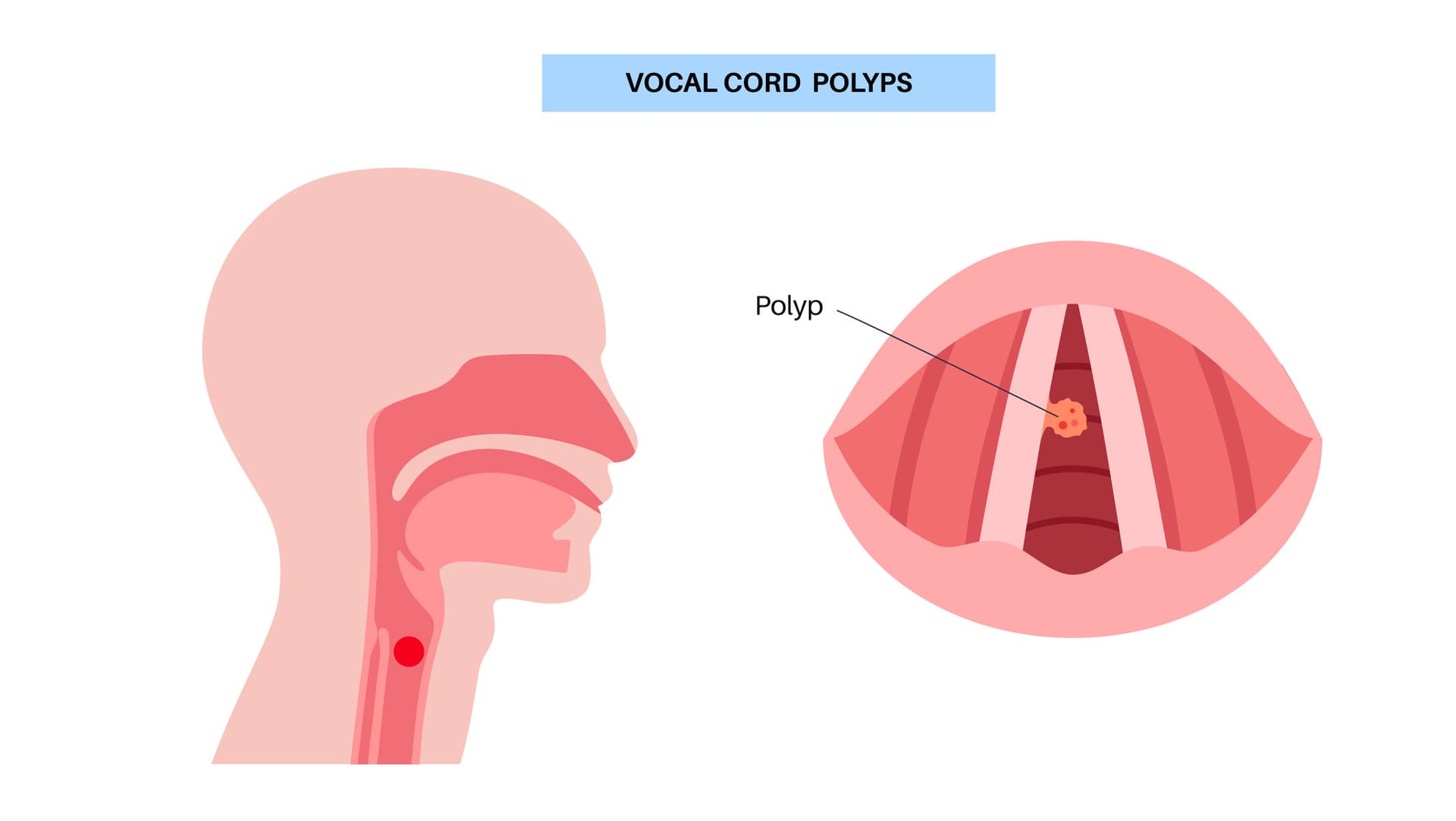
Vocal Fold Polyps: Diagnosis, Treatment, and Prevention
Vocal fold polyps, though less commonly discussed than nodules, represent another challenge to vocal health that individuals may encounter. Understanding the diagnosis, treatment, and prevention of vocal fold polyps is crucial for maintaining optimal vocal function and preventing potential complications. In this blog, we'll delve into the intricacies of vocal fold polyps, exploring their diagnosis, treatment options, and strategies for prevention.
Diagnosis of Vocal Fold Polyps
Vocal Fold Polyps are benign growths that develop on the vocal cords, often resulting from prolonged vocal abuse or misuse. Symptoms may include hoarseness, vocal fatigue, breathiness, and discomfort while speaking or singing. Diagnosis typically involves a thorough examination by a qualified voice specialist, such as Dr. Benjamin Rafii, utilizing techniques such as laryngoscopy to visualize the vocal cords and assess the presence of polyps. Accurate diagnosis is essential for guiding appropriate treatment interventions and preventing further vocal damage.
Risk Factors for Vocal Fold Polyps
Understanding the risk factors associated with the development of vocal fold polyps is essential for recognizing potential contributors to vocal health challenges. While vocal fold polyps can arise from various causes, certain factors increase the likelihood of their occurrence and may warrant closer attention. By identifying and addressing these risk factors, individuals can take proactive steps to minimize the risk of developing vocal fold polyps and maintain optimal vocal health.
- Chronic Vocal Abuse or Misuse: Prolonged or excessive vocal strain, such as shouting, screaming, or speaking loudly for extended periods, can irritate the delicate tissues of the vocal folds and contribute to the formation of polyps. Individuals with occupations or hobbies that involve frequent vocalization, such as singers, teachers, and coaches, may be particularly susceptible to this risk factor.
- Smoking and Tobacco Use: Tobacco smoke contains harmful chemicals that can irritate the respiratory tract and increase the risk of vocal fold irritation and inflammation. Smoking or exposure to secondhand smoke can exacerbate vocal fold damage and predispose individuals to the development of polyps.
- Chronic Coughing: Persistent or recurrent coughing, whether due to respiratory conditions, allergies, or other underlying factors, can place excessive strain on the vocal folds and contribute to vocal fold trauma. Individuals with conditions such as asthma, bronchitis, or gastroesophageal reflux disease (GERD) may be at heightened risk for vocal fold polyps as a result of chronic coughing episodes.
- Occupational and Environmental Factors: Certain occupations and environmental conditions may expose individuals to vocal strain or irritants that can impact vocal health. Jobs that require frequent talking, shouting, or exposure to airborne pollutants or allergens may increase the risk of vocal fold irritation and the development of polyps. Additionally, environmental factors such as dry air, pollution, and allergens can exacerbate vocal fold inflammation and contribute to vocal fold pathology.
- Gastroesophageal Reflux Disease (GERD): GERD, a condition characterized by the reflux of stomach acid into the esophagus, can lead to irritation of the larynx and vocal folds. Chronic acid reflux may cause inflammation and swelling of the vocal folds, predisposing individuals to vocal fold polyps and other vocal cord abnormalities.
By recognizing these risk factors and taking proactive measures to mitigate their impact, individuals can reduce the likelihood of developing vocal fold polyps and promote long-term vocal health. Consulting with a qualified voice specialist, such as Dr. Benjamin Rafii, can provide personalized guidance and support for addressing specific risk factors and maintaining optimal vocal function.
Treatment Options
Once diagnosed, the treatment approach for vocal fold polyps may vary depending on the size, location, and severity of the growths. In many cases, conservative management strategies such as vocal rest, voice therapy, and modifications to vocal technique may be sufficient to alleviate symptoms and promote healing. However, for larger or more persistent polyps, surgical intervention may be necessary to remove the growths and restore optimal vocal function. Dr. Rafii employs a personalized approach to treatment, tailoring recommendations to each patient's specific needs and goals.
Prevention Strategies
While vocal fold polyps can arise from various factors, adopting preventive measures can help reduce the risk of developing these growths and maintain vocal health. Key strategies for preventing vocal fold polyps include:
- Vocal Hygiene: Practicing proper vocal hygiene, including staying hydrated, avoiding vocal strain, and taking regular breaks during extended periods of vocal use.
- Vocal Technique: Employing healthy vocal techniques and seeking guidance from a voice coach or therapist to optimize vocal production and reduce the risk of vocal injury.
- Vocal Warm-Up: Incorporating vocal warm-up exercises into daily routines to prepare the vocal cords for speaking or singing activities and minimize strain.
- Environmental Considerations: Being mindful of environmental factors such as air quality, humidity levels, and vocal ergonomics to support vocal health and minimize irritation to the vocal cords.
By prioritizing vocal health and implementing preventive strategies, individuals can mitigate the risk of developing vocal fold polyps and maintain optimal vocal function for years to come.
Vocal fold polyps present a unique challenge to vocal health, but with proper diagnosis, treatment, and prevention, individuals can overcome these obstacles and preserve their voice. Through the expertise of specialists like Dr. Benjamin Rafii, tailored treatment plans and supportive care can guide patients towards vocal wellness. By prioritizing vocal hygiene, technique, and environmental considerations, individuals can take proactive steps to safeguard their vocal health and minimize the risk of vocal fold polyps. Remember, your voice is a valuable asset—take care of it with diligence and respect.
